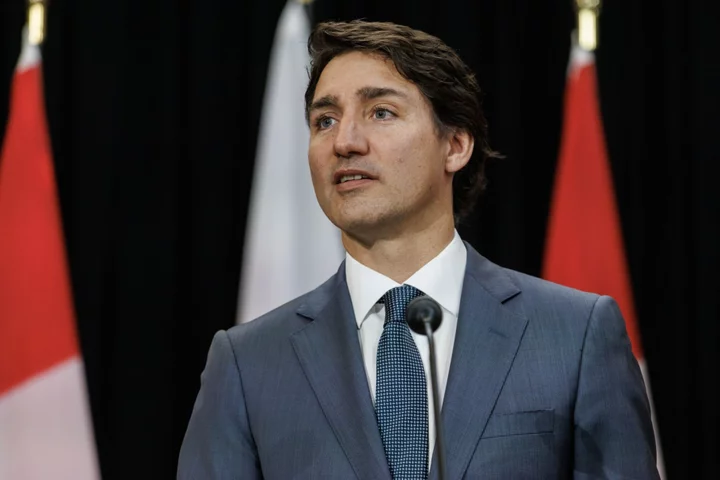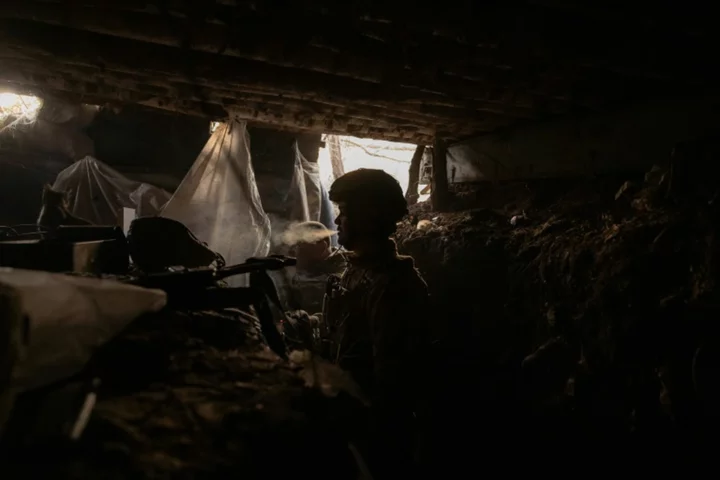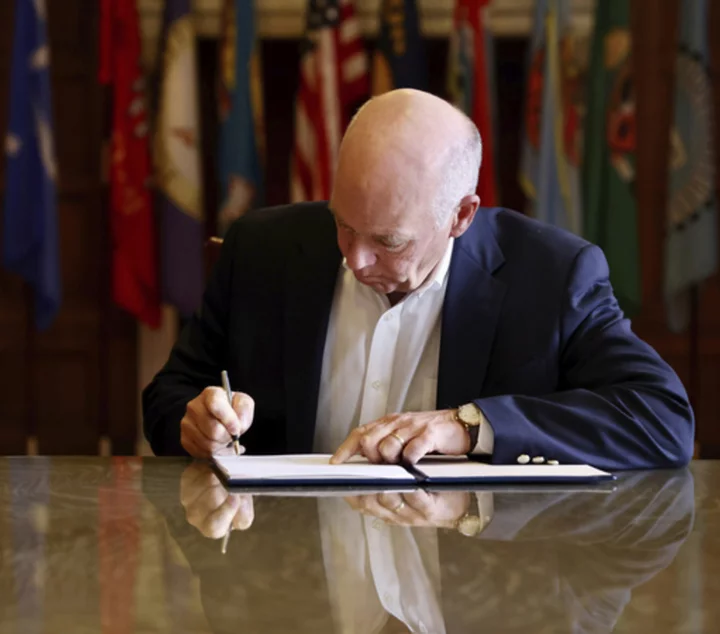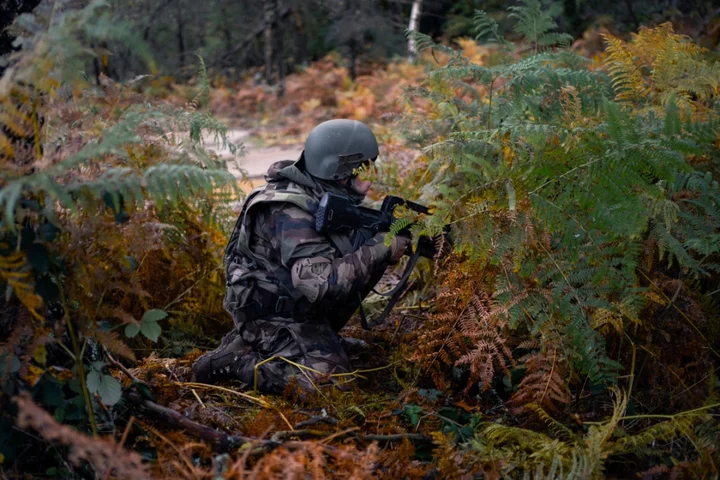Canada’s enormous wildfires and the acrid haze they’ve spread across North America have widened a schism in the country’s politics.
While politicians in Alberta and Saskatchewan — Canada’s oil-producing heartland — and Conservatives in Ottawa can no longer deny climate change, they continue to stand in the way of Prime Minister Justin Trudeau’s ambitions. That could leave one of the world’s biggest fossil fuel producers without a credible pathway to reduce carbon emissions at the same time that the impacts of climate change send its forests up in smoke.
The fires have burned through more than 13 million acres, an area twice the size of Massachusetts, putting this year on track to be the worst on record. As the blazes force tens of thousands from their homes and cloud the air with toxic smoke, Canada’s opposition leader has called for an end to the country’s carbon tax. Trudeau’s chief rival, the populist Conservative Pierre Poilievre, spoke for hours in Parliament last week in an attempt to stall the ruling Liberal Party’s budget. During his speech, he reiterated one of his signature promises should the Tories regain power: “Technology, not taxes.”
The pledge, which resonates deeply with Poilievre’s base in the Prairie provinces, illustrates the challenges ahead for Trudeau as he attempts to neutralize the country's carbon emissions by mid-century. Canada has the world’s third-largest nationally proven crude reserves, and oil and gas represent as much as 7% of the country’s GDP and a fifth of its goods exports. While the record-breaking wildfires have driven home the costs of climate inaction, politicians are still seizing upon the fears of Canadians about the short-term costs of action.
Because Canada has a very carbon-intensive economy, many voters, carbon-producing industries and the politicians who are allied with them have been resistant to climate policy, said Kathryn Harrison, a political science professor who studies environmental policy at the University of British Columbia.
Trudeau has pledged to cut emissions by 40% to 45% below 2005 levels by the end of this decade and reach net zero by 2050, but Harrison sees two major political barriers to reaching those goals. The first is that she doesn’t see how the targets can plausibly be achieved without a cap on oil and gas production. Trudeau’s government, under intense industry and political pressure, has refused to entertain a production cap. Instead, it has pledged C$12.4 billion ($9.4 billion) in tax credits for building carbon capture systems, even though most efforts to scale up the technology to date have not been successful.
The second challenge is Trudeau’s carbon price. The system imposes fees on major polluters and fossil fuel sales. The federal government then returns 90% of the revenue from the fuel levy to Canadians through rebate checks.
Harrison said that she expects Canadians to become accustomed to the rebate checks and eventually bristle at Poilievre or a future Conservative leader threatening to axe the tax. A recent report from Parliament’s spending watchdog found that most households will get back more than they pay in 2030 even though the levy is slated to rise. But in the meantime, the policy is not well-understood, and many Canadians who are already struggling with inflation recoil at anything that increases the already high cost of gas.
Natural Resources Minister Jonathan Wilkinson said in an interview that Canadians want his government to take action on climate change in a way that is mindful of affordability while creating jobs and economic opportunities for the future.
“It certainly can’t all be about sacrifice,” he said. “But I think Canadians also are cognizant of the fact that the costs associated with climate change are becoming more apparent every day — the costs of the wildfires, the costs of the floods, the emerging costs as we see the glaciers recede. We must address climate change or the costs of climate are going to be enormous and at some point they're going to be undefeatable.”
The Canadian Climate Institute, an environmental policy nonprofit that receives federal funding but does independent research, released a report last year chronicling the economic impact of climate change. It found that GDP could fall by 12% and incomes could drop 18% by century’s end if emissions continue to rapidly rise, among a slew of other dire economic impacts.
Alberta Premier Danielle Smith has been reluctant to tie the fires to climate change. When asked at an event last week whether she accepted that climate change is driving the worse wildfire season, she largely deflected the question and instead spoke about how human carelessness — such as cigarette butts tossed from car windows — has caused many of the province’s fires.
She said she’d work with Trudeau on reducing emissions, but that his current plans, including the goal of a net-zero electrical grid by 2035, are “unachievable.” Alberta’s oil sands represent about 97% of Canada’s oil reserves, producing about 3.25 million barrels of crude a day, more than the output of Kuwait. Current oil-sands production is up about 40% from a decade ago, and though it has fallen from a peak in 2020, it may begin increasing again next year after the completion of the Trans Mountain pipeline expansion.
Smith’s office didn’t respond to a request from Bloomberg to discuss the matter further. Conservative politicians at the federal level declined requests for comment. Yet even some of Smith’s cabinet ministers have acknowledged the role that climate change is playing in the worsening fire season.
“We look at the number and intensity of the fires this year and the widespread fires that we have — it’s something that we haven’t seen before,” Forestry Minister Todd Loewen said in response to a reporter’s question at a briefing in May. When pressed on what’s causing those changes, he added: “Definitely man has had an effect on our environment.”
Lynn Johnston, a forest fire research specialist with Natural Resources Canada, was even more blunt: “This is climate change action.”
Beyond the scope of the fires, perhaps the most shocking hallmark of this year's fire season has been the sheer number of fires happening simultaneously. A study published earlier this year links the expansion of fires in Western Canada, including in British Columbia, to greenhouse gas emissions.
“In the case of Alberta and Nova Scotia, they do typically have a spring fire season,” said Johnston. “However, that fire season is slowly creeping earlier and earlier. And under human-caused climate change, we're predicting that there's going to be a couple more weeks to a month, longer fire seasons in a lot of these areas.”
The blazes have hit during a crucial year for the trajectory of the country’s emissions targets, said Anna Kanduth, a research lead at the Canadian Climate Institute. The country is expected to unveil draft regulations for a number of policies that are a major part of its climate plans, including ones aimed at reducing oil and gas emissions, increasing access to clean electricity and stronger methane rules.
While the wildfires have pushed climate to the top of the agenda right now, momentum could dissipate when the smoke recedes. The University of British Columbia’s Harrison noted that 600 people in her province died during an extreme heat wave in 2021, which also saw wildfires consume the town of Lytton, B.C. But two years later, the national debate about climate policy remains largely where it was.
“Everybody said, ‘This will be the wake-up call.’ And maybe this one will be,” she said. But there's no way to slow climate change without some sacrifice, she added. “I think voters have to have an honest conversation that there is no magic here.”
Author: Laura Dhillon Kane, Kendra Pierre-Louis and Kevin Orland









